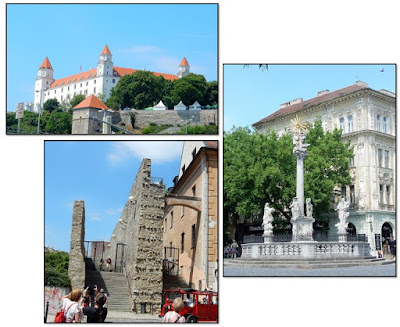One of the first things we saw when we docked at
Bratislava was
a UFO.
Actually it’s a restaurant on a bridge that looks like a flying saucer.
Slovakia, where Bratislava is located, became its own country in 1993 and has
been on its way to establishing itself as a world leader in economics and
politics. To that end it has participated in the European Union, NATO, the
Eurozone, the United Nations, the World Trade
Organization (WTO), and the European
Organization for Nuclear Research (CERN). Although this is a very forward
looking country, it has not lost its links to its past. The area we visited was
just as charming as the other small towns we saw along the Danube.
The several archaeological finds near present-day Bratislava show the area has been inhabited from 25 to 15 million years ago with permanent
Neolithic settlements
just on the edge of town. There is even an Eneolithic
fortified settlement where the medieval Bratislava Castle was
built. The city continued to thrive through the rule of the Celts, who actually
built a mint in the town, the Romans, who built baths, and the Slavs who built
the next Bratislava Castle. Trade increased from 1000 through the 1200s, as did
battles for the area; for centuries Hungary loses and reclaims this area many
times. The 18th century marked the rising of the Slovak National
Revival and Bratislava becomes one of the important centers of cultural
revival. Unfortunately, the city was hit with the plague which killed almost
4000 people. Once this epidemic ended, the Holy Trinity column was built in
thanksgiving. This ushered in a time of
economic growth, expansion (the town walls are demolished in 1775), and the
beginnings of art appreciation.
Religion and education were on the rise throughout Bratislava’s history
and the General Seminary for Catholic clergy
was housed in the Bratislava Castle. This began the standardization of the
Slovak language. With the arrival of the Royal Academy, in 1787, the ‘Department
of Czechoslovak Speech and Literature’ was created. The arts and sciences also
claim the city as home because of the Hungarian
Academy of Sciences (1820s) and Franz Liszt.
But back to the 14th Century: built into the city’s defensive walls
in 1311 was Saint Martin’s Cathedral.
It took until 1877 to finally finish construction, but the gothic chapels and
baroque sanctuary were attractive and important enough to become the site of
several coronations. As always I found the stained glass windows appealing,
particularly those around the sanctuary. There were some really great carvings
within the Cathedral. My favorite was the dragon, but unfortunately I never got
a good picture of it.
And of course, I was enamored with the public art. Bratislava has lots of statues, most of which I didn’t get to see. However, I did spot three
famous statues as we strolled through town, as well
as several others. One was ‘The Watcher’, although there is also a sign naming
him ‘Man at Work’. This happy little guy appears to be watching the world go by
from his spot in a man hole – the stories he could tell! Another is Ignac Lamar;
he is said to have loved a woman who scorned him so he gave flowers to random
women on the street. I’m not sure I like the story, but I did like the statue. Napoleon
and his army were in Bratislava in 1805 and one of his men stayed. He was in
love with a local girl and together they produced sparkling wine that bears his
name: Hubert. I would have loved to have found the rest of the statues hiding
in Old Town, but we had to go back to the ship.
 |
| UFO Bridge |
The several archaeological finds near present-day Bratislava show the area has been inhabited from 25 to 15 million years ago with permanent
 |
| Left T to B: Bratislava Castle, Old Walls Right: Holy Column |
Religion and education were on the rise throughout Bratislava’s history
 |
| Top L to R: Chapel, St Martin's Bottom L to R: Lion with snake, Stained glass |
And of course, I was enamored with the public art. Bratislava has lots of statues, most of which I didn’t get to see. However, I did spot three
 |
| Top L to R: The Watcher, Hans Christian Anderson Bottom L to R: Ignac Lamar, Hubert and Cynthia |
Our last stop on this trip was Budapest – another place I’d
never been. That’s the topic of my next blog!
 |
| Top L to R: Franz Liszt's house, Cute couple Bottom L to R: Sprinkler for humans, What to drink |
©2017 NearNormal Design and
Production Studio - All rights including copyright of photographs and designs,
as well as intellectual rights are reserved.
No comments:
Post a Comment